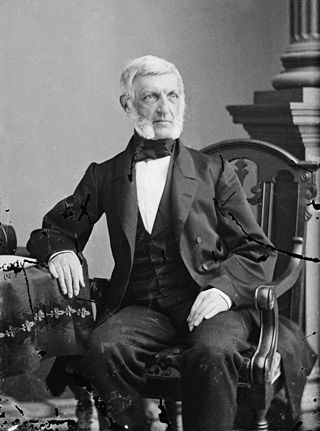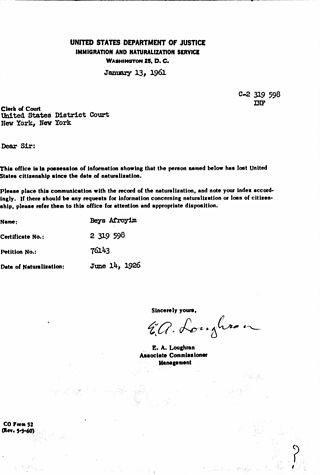
The Fourteenth Amendment to the United States Constitution was adopted on July 9, 1868, as one of the Reconstruction Amendments. Usually considered one of the most consequential amendments, it addresses citizenship rights and equal protection under the law and was proposed in response to issues related to formerly enslaved Americans following the American Civil War. The amendment was bitterly contested, particularly by the states of the defeated Confederacy, which were forced to ratify it in order to regain representation in Congress. The amendment, particularly its first section, is one of the most litigated parts of the Constitution, forming the basis for landmark Supreme Court decisions such as Brown v. Board of Education (1954) regarding racial segregation, Loving v. Virginia (1967) regarding interracial marriage, Roe v. Wade (1973) regarding abortion, Bush v. Gore (2000) regarding the 2000 presidential election, Obergefell v. Hodges (2015) regarding same-sex marriage, and Students for Fair Admissions v. Harvard (2023) regarding race-based college admissions. The amendment limits the actions of all state and local officials, and also those acting on behalf of such officials.

The Titles of Nobility Amendment is a proposed and still-pending amendment to the United States Constitution. The 11th Congress passed it on May 1, 1810, and submitted to the state legislatures for ratification. It would strip United States citizenship from any citizen who accepted a title of nobility from an "emperor, king, prince or foreign power". On two occasions between 1812 and 1816, it was within two states of the number needed to become part of the Constitution. Congress did not set a time limit for its ratification, so the amendment is still pending before the states.
United States v. Wong Kim Ark, 169 U.S. 649 (1898), was a landmark decision of the U.S. Supreme Court which held that "a child born in the United States, of parents of Chinese descent, who, at the time of his birth, are subjects of the Emperor of China, but have a permanent domicile and residence in the United States, and are there carrying on business, and are not employed in any diplomatic or official capacity under the Emperor of China", automatically became a U.S. citizen at birth. This decision established an important precedent in its interpretation of the Citizenship Clause of the Fourteenth Amendment to the Constitution.
Minor v. Happersett, 88 U.S. 162 (1875), is a United States Supreme Court case in which the Court held that citizenship does not confer a right to vote, and therefore state laws barring women from voting are constitutionally valid. The Supreme Court upheld state court decisions in Missouri, which had refused to register a woman as a lawful voter because that state's laws allowed only men to vote.

United States nationality law details the conditions in which a person holds United States nationality. In the United States, nationality is typically obtained through provisions in the U.S. Constitution, various laws, and international agreements. Citizenship is established as a right under the Constitution, not as a privilege, for those born in the United States under its jurisdiction and those who have been "naturalized". While the words citizen and national are sometimes used interchangeably, national is a broader legal term, such that a person can be a national but not a citizen, while citizen is reserved to nationals who have the status of citizenship.

The Bancroft treaties, also called the Bancroft conventions, were a series of agreements made in the late 19th and early 20th centuries between the United States and other countries. They recognized the right of each party's nationals to become naturalized citizens of the other and defined circumstances in which naturalized persons were legally presumed to have abandoned their new citizenship and resumed their old one.
Yick Wo v. Hopkins, 118 U.S. 356 (1886), was a landmark decision of the United States Supreme Court in which the Court ruled that a prima facie race-neutral law administered in a prejudicial manner infringed upon the right to equal protection guaranteed by the Fourteenth Amendment to the U.S. Constitution.
Trop v. Dulles, 356 U.S. 86 (1958), was a United States Supreme Court case in which the Court ruled that it was unconstitutional to revoke citizenship as a punishment for a crime. The ruling's reference to "evolving standards of decency" is frequently cited in Eighth Amendment jurisprudence.

Afroyim v. Rusk, 387 U.S. 253 (1967), was a landmark decision of the Supreme Court of the United States, which ruled that citizens of the United States may not be deprived of their citizenship involuntarily. The U.S. government had attempted to revoke the citizenship of Beys Afroyim, a man born in Poland, because he had cast a vote in an Israeli election after becoming a naturalized U.S. citizen. The Supreme Court decided that Afroyim's right to retain his citizenship was guaranteed by the Citizenship Clause of the Fourteenth Amendment to the Constitution. In so doing, the Court struck down a federal law mandating loss of U.S. citizenship for voting in a foreign election—thereby overruling one of its own precedents, Perez v. Brownell (1958), in which it had upheld loss of citizenship under similar circumstances less than a decade earlier.
United States citizenship can be acquired by birthright in two situations: by virtue of the person's birth within United States territory or because at least one of their parents was a U.S. citizen at the time of the person's birth. Birthright citizenship contrasts with citizenship acquired in other ways, for example by naturalization.
The Citizenship Clause is the first sentence of the Fourteenth Amendment to the United States Constitution, which was adopted on July 9, 1868, which states:
All persons born or naturalized in the United States, and subject to the jurisdiction thereof, are citizens of the United States and of the State wherein they reside.
Elk v. Wilkins, 112 U.S. 94 (1884), was a United States Supreme Court landmark 1884 decision with respect to the citizenship status of Indians.
Vance v. Terrazas, 444 U.S. 252 (1980), was a United States Supreme Court decision that established that a United States citizen cannot have their citizenship taken away unless they have acted with an intent to give up that citizenship. The Supreme Court overturned portions of an act of Congress which had listed various actions and had said that the performance of any of these actions could be taken as conclusive, irrebuttable proof of intent to give up U.S. citizenship. However, the Court ruled that a person's intent to give up citizenship could be established through a standard of preponderance of evidence — rejecting an argument that intent to relinquish citizenship could only be found on the basis of clear, convincing and unequivocal evidence.
Nishikawa v. Dulles, 356 U.S. 129 (1958), is a United States Supreme Court case in which the Court ruled that a dual United States/Japanese citizen who had served in the Japanese military during World War II could not be denaturalized unless the United States could prove that he had acted voluntarily.

Citizenship of the United States is a legal status that entails Americans with specific rights, duties, protections, and benefits in the United States. It serves as a foundation of fundamental rights derived from and protected by the Constitution and laws of the United States, such as freedom of expression, due process, the rights to vote, live and work in the United States, and to receive federal assistance.
Rogers v. Bellei, 401 U.S. 815 (1971), was a decision by the United States Supreme Court, which held that an individual who received an automatic congressional grant of citizenship at birth, but who was born outside the United States, may lose his citizenship for failure to fulfill any reasonable residence requirements which the United States Congress may impose as a condition subsequent to that citizenship.

The Expatriation Act of 1868 was an act of the 40th United States Congress that declared, as part of the United States nationality law, that the right of expatriation is "a natural and inherent right of all people" and "that any declaration, instruction, opinion, order, or decision of any officers of this government which restricts, impairs, or questions the right of expatriation, is hereby declared inconsistent with the fundamental principles of this government".
Kennedy v. Mendoza-Martinez, 372 U.S. 144 (1963), was a Supreme Court of the United States case in which the Court amended United States nationality law with respect to draft evasion.

The Nationality Act of 1940 revised numerous provisions of law relating to American citizenship and naturalization. It was enacted by the 76th Congress of the United States and signed into law on October 14, 1940, a year after World War II had begun in Europe, but before the U.S. entered the war.
Mackenzie v. Hare, 239 U.S. 299 (1915), is a United States Supreme Court case that upheld Section 3 of the Expatriation Act of 1907, which dictated that all American women who voluntarily married a foreign alien renounced their American citizenship. While the statute has since been repealed, this case remains significant because of its precedent that Congress can designate acts which serve as implied voluntary renunciation of one's American citizenship.







